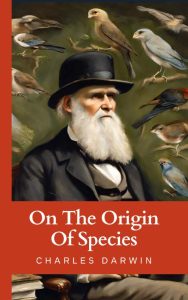On The Origin Of Species by Charles Darwin

Download and Enjoy On The Origin Of Species by Charles Darwin
Thank you for your interest in downloading On The Origin Of Species by Charles Darwin. Please find the free ebook versions below.
About this Public Domain Book
This full text of On The Origin Of Species has entered the public domain in the UK and is now freely available. It may be reproduced, distributed, or transmitted without any restrictions. We are providing it for free distribution and use by individuals for non-commercial purposes. Please note that the copyright status in other countries may vary, so it is advisable to check the copyright laws of your specific jurisdiction before reproducing, distributing, or transmitting the text.
Download On The Origin Of Species by Charles Darwin As A Free Ebook
You can download this book in two common ebook formats:
- EPUB format - compatible with most e-readers like Kindle, iPad, Nook, etc.
- PDF format - useful for printing or viewing on any device
First published: 24th November 1859
Number of Words: 210,000
Avg. Time to Read: 15 - 20 hours
Description:
Darwin began to outline his theory of natural selection in 1838 after returning from his voyage on the HMS Beagle, where he witnessed evolution and adaptation firsthand in the various species he observed in the Galapagos Islands and South America. He spent twenty years researching natural selection and the evolution of species before publishing his seminal work, On the Origin of Species, in 1859. The book caused immediate controversy due to its implications for religion and humanity’s place in the natural world. Darwin refined his theory over several editions of Origin and other works he published later in his lifetime.
In Origin, Darwin proposed that all species of life have evolved over time from common ancestors through a process he called natural selection. Natural selection, according to Darwin’s theory, results from four main factors: 1) variation exists within all populations of a species, 2) this variation is heritable from one generation to the next, 3) some variations result in organisms more suited to their environment and thus more likely to survive and reproduce, and 4) reproduction leads to the proliferation of those inheritable traits most beneficial for survival in a given environment. With each new generation, the heritable variations accumulate to produce distinct populations that over long periods of time can become new species adapted to different ecological niches.
Darwin backed up his theory with extensive examples from animal domestication, where humans had bred particular traits into populations over generations of selective reproduction. He also offered evidence from geographical distribution of related species and fromcomparative anatomical studies of both living and extinct species. The strength of Darwin’s work also came from raising difficult questions about evolution that needed further research, fueling continued investigation and scientific discovery in fields like embryology, biology, biogeography and paleontology. His formulation presented evolution as an undirected yet somewhat predictable process through natural mechanisms rather than supernatural acts or influences.
Origin advanced science by offering the first fully naturalistic explanation for adaptation and the diverse forms of life. It presented a unified theory that explained phenomena across many fields of natural science. Though controversial at the time, Darwin’s writings inspired a revolution in scientific thought and became the foundation of modern evolutionary biology. His notion of evolution through natural selection is now supported by evidence from various scientific fields, making natural selection and common descent a scientific consensus and one of the fundamental principles of modern science. Though furthering scientific knowledge, Darwin’s theory also sparked ongoing debate over its implications regarding humanity’s place in nature that continues even today.
Download:
Need Help Loading the Book onto Your Device?
If you encounter any issues while loading the book onto your device, check out our guide on loading books from 250 WPM onto your device.
